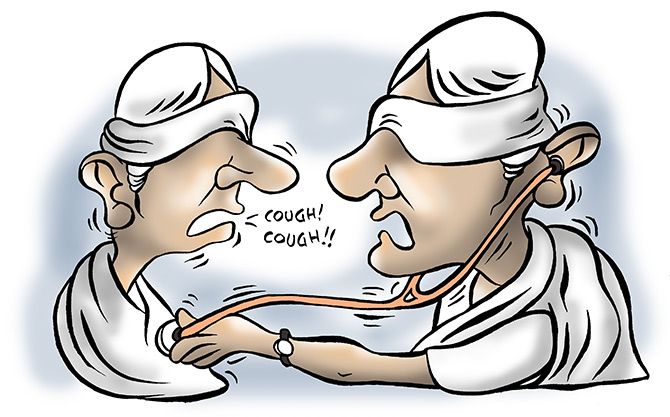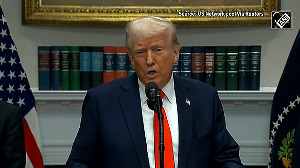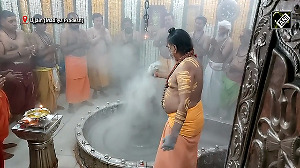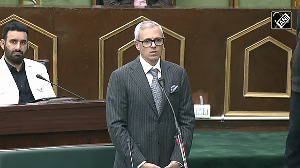'It is the common people, not lawyers and judges, who are the stakeholders of the judiciary.'
Geetanjali Krishna reports.

Illustration: Uttam Ghosh/Rediff.com
On January 12, when four of the senior-most judges in the Supreme Court voiced their concerns about the functioning of the judiciary at an unprecedented press conference, some cried foul.
However, many others heralded it as a brave move that highlighted the need to make Indian courts transparent and accountable.
While in the last few years the issue of judicial reforms has been discussed among lawyers and lawmakers, the average man on the street remains largely unaware of the implications this could have on his life.
This is exactly what Campaign for Judicial Accountability and Judicial Reforms (CJAR) is seeking to change.
"The judiciary has two key functions -- to decide individual cases and maintain a check on the government and legislature," says Prashant Bhushan, the lawyer and activist spearheading this campaign.
The first function, he points out, isn't being discharged satisfactorily as the majority of Indians don't have access to its legal system, which is often expensive and time-consuming.
The few who do find that cases drag on in courts for so long that the delay is akin to a denial of justice.
"Additionally, our systems tend to have an elitist bias," says Bhushan. "This makes it hard for slum dwellers, refugees, street vendors and others to get justice."
On its Web site, CJAR has initiated a variety of activities to highlight and advocate for judicial accountability.
Judge Watch provides case studies with details of the complaint filed by CJAR against the corrupt practices of individual judges.
The campaign files two to three complaints a year, ensuring it has enough legally admissible proof to back them.
Judgement Watch highlights landmark judgments such as the Supreme Court imposition of a 100 per cent penalty on mining companies in Odisha found guilty of rampant illegal and rapacious mining by the Justice Shah Commission.
In addition to exposing and challenging judicial corruption, CJAR is advocating for asset declaration by judges and greater transparency in their appointments and transfers.
"We want all court proceedings to be videotaped and perhaps even live-streamed online," says Bhushan.
"When Indian courts permit members of the public to physically come and watch their proceedings, why should this not be available to a wider audience?"
It has been shown the world over that the simple and relatively inexpensive act of videotaping all proceedings ensures better practices being followed, be it in police stations, government offices or courts.
CJAR is advocating for an amendment of the Contempt of Courts Act and for the formation of an independent commission with disciplinary powers over judges.
These steps will go a long way in improving the Indian judicial system.
"Known for its progressive judgements, the judiciary has been responsible for making government functioning more transparent and accountable," says Anjali Bhardwaj, member of the CJAR executive committee.
"It's time for the internal workings of the courts, such as judge appointments, to be made equally so..."
CJAR's patrons include senior retired judges, law professors, journalists and activists. It is endorsed by over 70 NGOs and civil society organisations across India. In fact, some have expressed interest in forming state-level chapters of CJAR.
But the doughty lawyer feels the road ahead will be long and rocky.
"Judicial reform hasn't become a political issue yet," Bhushan says.
The need of the hour, he says, is a full-blown campaign demanding judicial accountability, on the lines of Anna Hazare's campaign against corruption.
Limited by lack of funding, CJAR is unable to hire the full-time dedicated staff required to work on this.
Bhushan, a busy lawyer, wears too many hats to focus exclusively on this campaign. What motivates him and other activists to carry on is their fervent belief that a strong judiciary is one of the most important features of a democracy.
"It is the common people, not lawyers and judges, who are the stakeholders of the judiciary," he says.
"That's why the demand for a transparent and accountable judiciary is not just coming from us at CJAR, but from every citizen in the country."
Visit judiciareforms.org or follow Prashant Bhushan on Twitter.












 © 2025
© 2025